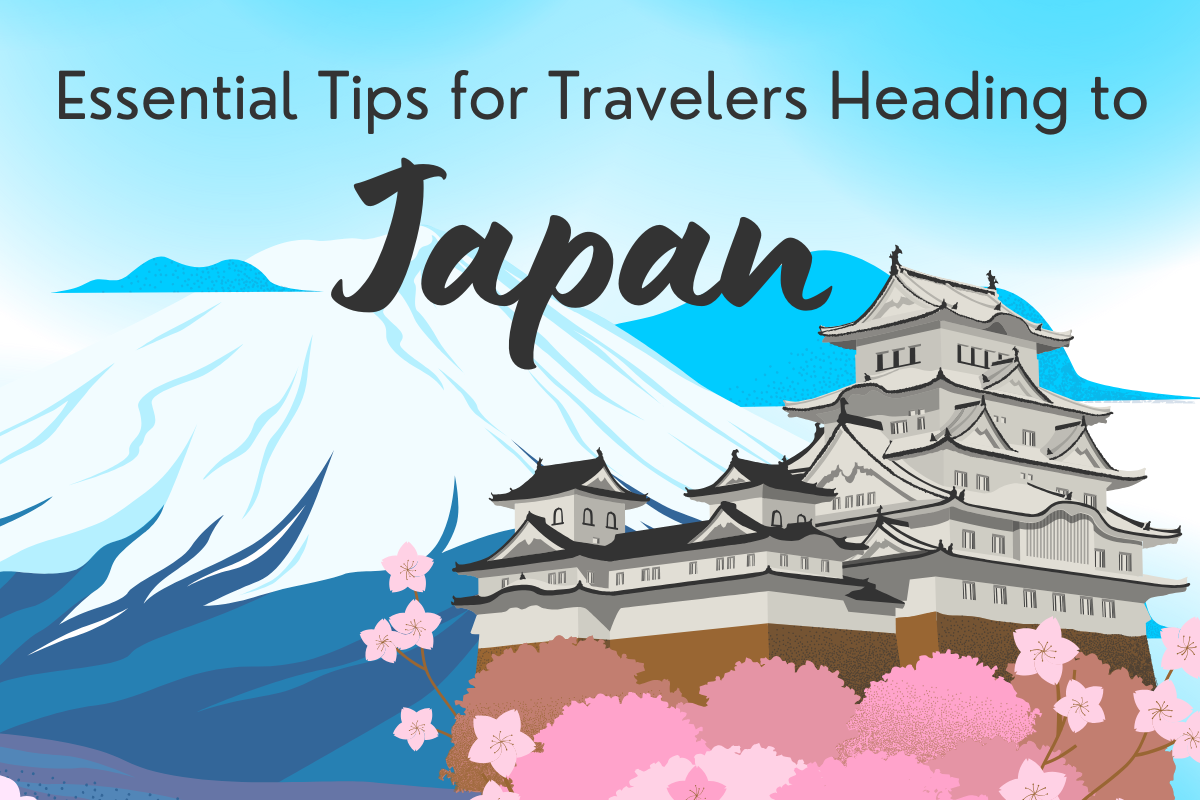Essential Tips for Travelers Heading to Japan
Posted on January 6, 2025 by Ghoomophiro

Japan is a world of wonder, a world where tradition and modernity collide in wonderful ways. Even though the culture there is often perceived to be steeped in etiquette, visiting Japan doesn’t have to be overwhelming. It could be smooth and enriching with some preparation and open-mindedness.
The most practical tips to make good use of your trip to Japan are as follows:
1. Book your room in advance
Many hotels, ryokans, and even Airbnb rentals are fully booked during the travel season, especially around March-April for cherry blossom viewing seasons, Golden Week between 29 April and 5 May, and mid-August.
Planning will help you get the best stay. The smaller inns usually have fixed times when one is allowed to check-in so make sure that you plan on time.
Pro Tip: Choose places that are conveniently near public transport to make your life more effortless.
2. Pack light to travel pain-free
Hotel rooms are typically small in Japan, especially around metropolitan areas. Large luggage could be a hassle to maneuver around on public transport. Try this minimalist packing approach.
While temples and shrines do not enforce dress codes, bringing modest clothing for formal dining or traditional tea ceremonies is a good idea.
Pro Tip: Use takkyubin, or luggage forwarding services, to send your bags ahead between cities.
3. Connected to the unlimited 5G data
Japan has a very complicated addressing system, even the locals find it challenging to navigate. Avoid connectivity issues with unlimited 5G data using the TSIM Japan eSIM. Activate now and stay connected with reliable coverage as your go-to tool with maps, translation apps, and staying connected on-the-go.
Pro Tip: Download offline maps and translation apps for backup to save battery.
4. Slip on comfort shoes to keep them handy.
Be prepared to take off your shoes frequently, whether at traditional restaurants, temples, or ryokan. Slip-on shoes make this process easier, and wearing socks can add an extra layer of comfort when switching to communal slippers provided at these venues.
5. Learn to love Japan’s toilets
In Japanese toilets, high-tech bidets are known as “washlets.” They usually have pictograms to name the buttons for self-cleaning and drying. Do not always count on a hand towel or dryer at a public toilet, so do carry a small cloth along.
Pro Tip: Many times the free restrooms could be taken at the convenience store, department store, or train station.
6. Prepare for extreme weather.
Weather varies seasonally and regionally across Japan. Summers are quite warm and humid, so make sure to drink enough fluids and carry a parasol to block UV rays. For visitors, typhoon season, September and October, should have up-to-date weather from the Japan Meteorological Agency.
In other parts, like Hokkaido, winters might have a lot of heavy snow falls, perfect for winter-sport enthusiasts.
7. Always Carry Cash
While credit cards are widely accepted in urban areas, cash only is usually accepted in rural areas and family-owned shops. ATMs at places such as 7-Eleven are a good option for withdrawing cash. When paying, use the tray provided instead of handing money to the cashier.
8. Avoid the Tipping
Hospitality is not one of Japan’s norms, especially regarding tipping. In most cases, small restaurants and bars may add a service fee, usually given when presenting your bill. Guides with experience of international travelers appreciate receiving a tip, but tipping is certainly not obligatory.
9. Appreciate the Queue Culture
Orderly lines are a hallmark of Japanese society, whether at train stations or checkout counters. On train platforms, wait for passengers to disembark before boarding. Once the doors open, seating becomes first-come, first-serve.
10. Know Your Escalator Etiquette
Lines are orderly at train stations and checkout counters. At train station platforms, wait for other passengers to get off before boarding the train. Once the doors have opened, seating is up for grabs on a first-come, first-served basis.
11. Plan according to public transport hours.
Trains in cities and subways stop at midnight or 1 am. One might miss the last train, which would mean spending a lot of money on a taxi ride. Look up schedules to avoid being caught off guard by unexpected delays.
Pro Tip: Use HyperDia or Google Maps to plan your journey and find the last train times.
12. Don’t eat on the go
In Japan, people rarely have food on the go, unless it is a food bazaar, festival, or long-distance train such as shinkansen. There are usually good times when one can enjoy a bento box while looking out at the scenery.
13. Be Prepared for Natural Disasters
Japan’s location along tectonic plates makes it prone to earthquakes and tsunamis. In the event of an earthquake, stay calm, seek cover under sturdy furniture, and follow local guidance. Tsunami warnings require immediate evacuation to higher ground if you’re near the coast.
14. Learn Some Basic Japanese Phrases
Though English is widespread in cities, some Japanese expressions can really compliment your visit:
Sumimasen (excuse me): Helpful to draw attention nicely.
More a way of saying it with thanks using form.
Mochikaeri: Convenient for food orders to take away.
Onegai shimasu (“please”): Ideal to make polite requests.
Pro Tip: Download a Japanese phrasebook app to practice on the go.
15. Plan Wisely Around Peak Travel Seasons
If you’re traveling during Japan’s busy seasons, like cherry blossom time or the New Year’s period, expect crowded attractions and limited availability for tours or accommodations. Research ahead to avoid disappointment and make early reservations wherever possible.
Pro Tip: Check for regional festivals or events during your visit to enhance your cultural experience.
Japan’s unique blend of old and new makes it a must-visit destination. With these tips in mind, you’ll be ready to navigate its cultural quirks and create unforgettable memories. And don’t forget: with TSIM’s Japan eSIM providing unlimited 5G data, staying connected and informed has never been easier. Safe travels!




